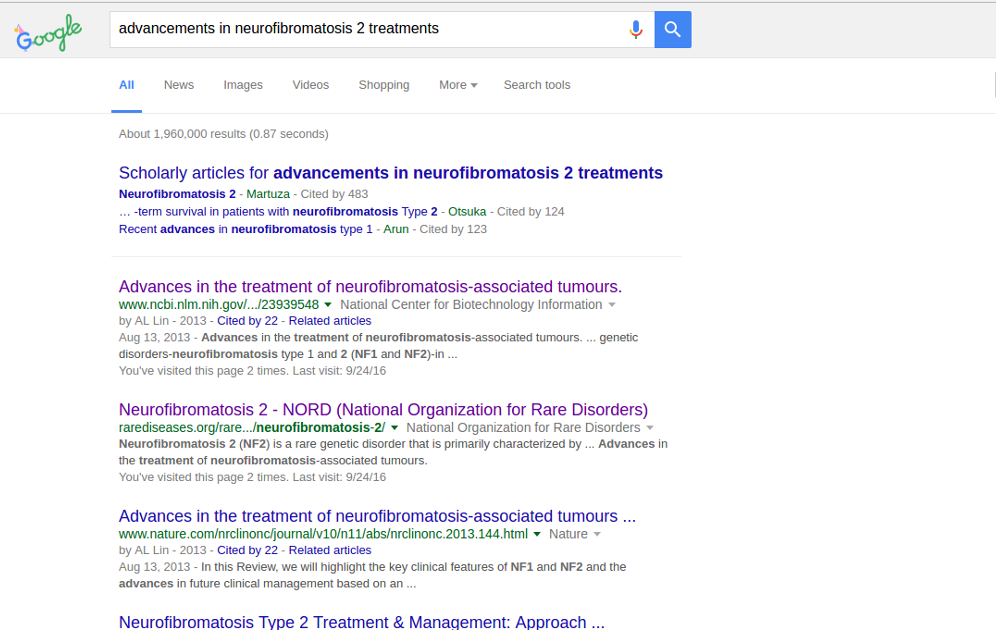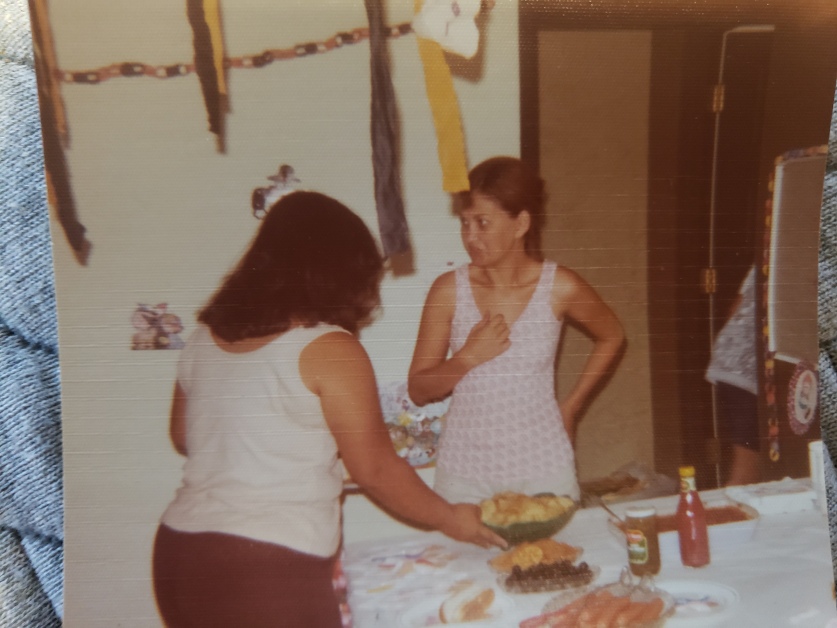People keep telling me to stop Googling NF2. To stay positive and maintain hope that my sciatic tumor is just a one-off deal that isn’t linked to my dad’s condition. For now I’m choosing to believe that this is another case of people knee-jerk reacting and saying what they think is the socially acceptable response to news like this, because otherwise what they’re implying is incredibly hurtful and ableist as hell.
The implication, of course, when someone says to stay “positive” while I’m actively trying to wrap my head around the genetic likelihood of having NF2, is that NF2 itself is a negative, and the only positive, hopeful outcome would be for me to not have it at all.
First of all, there is absolutely life, and a lot of it, to be had after an NF2 diagnosis, if that’s even what I happen to have. And while I’m scared and sometimes I cry hysterically at the thought of having multiple tumors in brain and in my spine, I happen to know from firsthand experience that NF is not an immediate death sentence. My dad lived with NF2 for nearly two decades. Sure, he was in pain and it sucked a lot of the time, but that man lived. We wouldn’t be so bereft at his passing if he hadn’t.
Second, researching NF2 is filling my days with an almost ridiculous abundance of hope and positivity. I mean, it’s not like I actually want to have Neurofibromatosis of course, but the reality of whether or not I have it was made long before I was even born. I can’t bargain or plead or bully my way out of it. All I can do is move forward with the best information, support, and mindset that I can muster.
And it just so happens that when it comes to information, Dr. Google is far better than any doctor I have seen up to this point. Every single physician I have had since my father’s diagnosis has been enormously dismissive of my fears. I have had to cajole my way into the ultrasound that discovered my Schwannoma. I have been treated like a hypochondriac for complaining of tinnitus, pain, and vertigo – the very symptoms that often uncover this condition.
Doctors have told me that Neurofibromatosis is a rare disorder, as if that was supposed to assuage my very real and very understandable fear of having been passed down my father’s genetic code. Not one single doctor ever said “hey, NF2 is rare for sure, but with a parent affected you have a fifty percent chance of having been passed the code for it so let’s monitor you closely for this here list of symptoms just to be sure.”
Instead of information, I was given empty reassurances that developing NF2 was improbable, that it would have manifested in adolescence, that I, at forty years-old, was fundamentally out of the woods. Also, that painful lump I’ve been complaining about for two years now is just a muscle knot, keep on going to Physical Therapy because it for sure doesn’t feel like a tumor.
But, you know. Here we are.
For better or worse, Dr. Google never dismisses my concerns. Dr. Google doesn’t view my possible NF diagnosis as either positive or negative. Dr. Google just tells me things no one else has been able to say, and somehow that is making these weeks of waiting a little more bearable.
Dr. Google is also a repository of hopeful information, showing me all the ways I can live with Neurofibromatosis rather than lament all the ways my life will be over because of it. Because of the Internet searching some folks are so quick to discourage, I know there is an NF2 specialist five-and-a-half miles from my home. I know the hospital this particular specialist practices at has a gamma knife, in case there are small-to-medium sized tumors in my brain in need of removal. I know that a young man in California just became the first quadriplegic to regain the use of his upper body after experimental stem-cell treatment. I know about motorized wheelchairs and robotic exoskeletons and dozens of other mobility aids that can help me navigate whatever might be coming my way. And best of all, I know that there are groups and organizations and communities out there to keep me from feeling so all alone.
Whether or not I research Neurofibromatosis will not affect whether or not I have the condition. I can’t “catch” NF2 even if I perform a billion and one Google searches on vestibular schwannomas, and I can’t think my way into tumors no matter how much of a headache it is to try and decipher mouthfuls medical terminology. But what I can catch, what I can think my way into, is a sense of informed hope and futuristic possibilities. A preparedness that makes me feel completely ready to meet with the neurologist on Monday and tell him in no uncertain terms that I am here for whatever long haul I have ahead.
So, no, friend. I am not going to stop looking up things on the Internet. And I am not going to shy away from whatever happens next. I don’t need to not have Neurofibromatosis in order to stay positive. I mean, I am for sure holding out the sliver of hope that this tumor is indeed some kind of freakshow one-off. I do not want to find more tumors, or to need any of the incredible scientific advancements that made in the nearly thirty years since my father’s passing. But that doesn’t mean it’ll be the end of the world, or me, if that’s where this is going.
There are many kinds of hope. And I, for one, am going to surround myself with them all.




Very well said. Dr. Google, not the first genetic counsellor I saw, was actually more help to my husband and me when I received my genetic diagnosis. (If you remember, it’s balanced, which means I don’t suffer any major health issues other than related to fertility, but it’s so rare that there are only 50 known families worldwide who also have it. Even without the obviously scary health impairments you might face, being told you have something bloody rare is a !@#$%ing frightening place to be.)
You are smart enough to be able to read medical journals and parse the information to have an intelligent conversation with your doctors. For me, and I believe you, that is our personal way of being positive. Not shying away from facts, but absorbing them so we can figure out what the hell to do next.
Holding your hand, my dear. May you receive good news very soon.
Thank you so much, Lauren. And I do remember when you were educating yourself about your diagnosis. Having to wait so long in between appointments is bad enough, and to top it all off every single visit seems so short with so much information being exchanged and decisions needing to made pretty quickly. We’re so fortunate that we have so much information available to us so that we can bring a solid list of questions and concerns to our doctors so that we have a shot at making the right decisions. I don’t know how I’d handle this without the internet and modern diagnostic techniques. This right here is frightening and difficult enough as it is!
Yes! And can you imagine not being able to figure out the overwhelming—and often terrifying—information out there? In other words, can you imagine relying solely on your doctors’ opinions? Oh wait, yeah. YOU DID. FOR 30 YEARS. >:(
Positivity and preparedness are not mutually exclusive! I hate that line of reasoning. Just magically pretend this possibility isn’t possible for a few weeks, okay? Maybe just place your brain on the nightstand and carry on until your diagnosis. That’s the positive thing to do!
Also, it is so beyond infuriating how doctors don’t listen to women. RAGE.
Love you, Celeste. You are brave and strong and doing the most optimistic, positive thing you can possibly do right now: facing your possibilities and learning all the ways you are going to continue to have a kick-ass life, whatever the diagnosis.
Lolol I love you. I wish I could put my brain on the nightstand. Also maybe if I did that, I could just *see* if I have any tumors without having to wait almost another MONTH for an MRI. 😛
And omfg I am so frustrated with not being listened to by doctors. My dad was diagnosed and had his first surgery by the time he was 30. I started exhibiting symptoms, including a pain in what we now know to be the tumor on my sciatic nerve, and it was dismissed for a long time. Why? Because it was worse during my period, so the official diagnosis in my chart for the longest time was “dysmenorrhea”. Maybe if I had been born a dude, I would have gotten an earlier diagnosis and already be on my treatment regiment. BLAH.
I like your outlook! Good for you!
<3 <3 <3 Thank you, W!